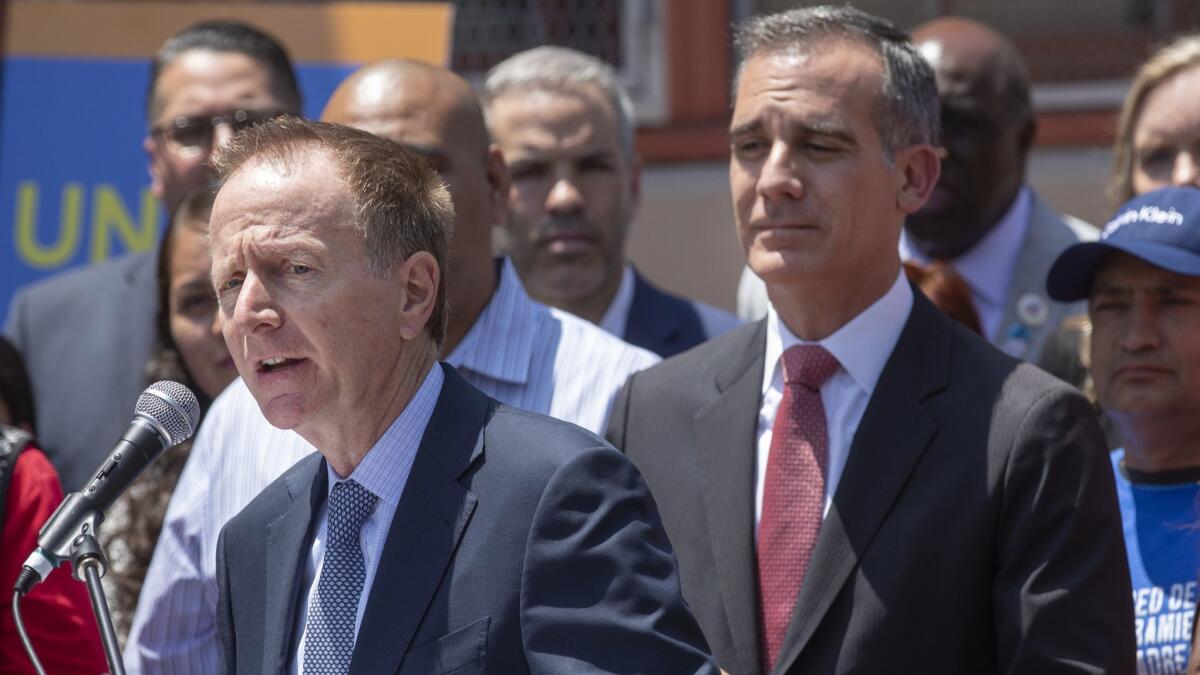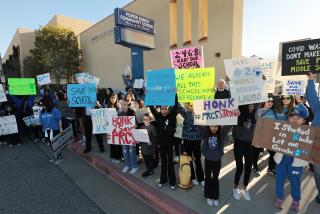After failed funding campaign, L.A. Unified chief outlines budget plan

Los Angeles schools Supt. Austin Beutner on Thursday laid out a tight budget — which includes some layoffs — while signaling potential financial trouble ahead for the nation’s second-largest school district.
He also targeted new potential state funding sources.
The school system and the city of Los Angeles also formally withdrew from an education partnership with the Los Angeles Area Chamber of Commerce.
The presentation and the civic divorce were fallout from voters’ rejection this week of Measure EE, a property tax that would have raised an estimated $500 million a year for public schools. The chamber and other business groups had campaigned against the measure.
Measure EE was supposed to be the next step in a reinvigorated, better-funded school system, but Beutner and others were left scrambling for Plan B.
A fundamental and persistent problem is that the district is on track to spend more than it’s taking in over the next three years, and will need to rely on reserves and one-time funding sources, Beutner said.
Ultimately, “either we find more revenue or we’ll have to face a series of choices,” Beutner said during a briefing at district headquarters.
A senior county official noted that L.A. Unified had developed a balanced budget for next year without Measure EE, but that problems loom ahead.
“Progress has been made,” said Debra Duardo, superintendent for the L.A. County Office of Education, which provides financial oversight. But “put simply, LAUSD needs to stop spending more than it receives from the state and federal government, which it does every year.”
The county’s analysis has its critics, mainly because L.A. Unified has defied doomsday budget predictions over the last decade. It helps that state tax revenues have surged over those years, in effect, wiping away past deficits.
But the district has committed to increased spending in the new teachers contract and also faces rising healthcare costs and declining enrollment — about 14,000 students a year — which reduces state funding. The state also is requiring sharply higher pension contributions.
“The reckoning is still coming, but we are doing the best we can to be as efficient as possible,” Beutner said.
Those efficiencies include eliminating 289 central office positions, where cuts are expected to save more than $40 million. Beutner said the district would, when possible, carry out the reduction through attrition and retirements. Some displaced workers might fill other jobs.
The cuts include accountants, budget analysts, clerical workers, a legislative analyst, a bus dispatcher, a contract administrator, a stock worker, a translator and various academic subject coordinators.
These cutbacks were going forward with or without Measure EE.
Beutner took issue with frequent claims that the district’s bureaucracy is bloated. He said the central office consumes about 3% of the budget, and he challenged critics to find wastefulness and overstaffing.
“It is a mythology that we have way too many administrators,” he said.
On the revenue side, district efforts include pushing for a revised funding formula for students with disabilities. Currently, funding for their needs is based on total enrollment, while their actual numbers and the cost of serving them is not taken into account. Beutner also doesn’t want the district penalized when students are absent from school. Poor attendance is a problem that requires more resources — not fewer — to deal with, he has said.
The schools chief also would like to see the threshold for passing a tax like Measure EE dropped from a two-thirds majority to 55%, although that would not have helped Measure EE. Interviewed separately, Board of Education members were divided on whether to try again for a local tax measure and when to do it.
The June 1 letter to the Chamber of Commerce outlined dire needs in schools and noted that a goal of the partnership has been improved funding: “The chamber has made clear that it is not a reliable partner to our schools.”
The letter was signed by Beutner, L.A. Mayor Eric Garcetti, Rusty Hicks, president of the L.A. County Federation of Labor, and leaders of the unions representing district teachers and administrators.
After the election, Beutner, Garcetti and teachers union President Alex Caputo-Pearl talked about a betrayal of children by business leaders.
The business groups, which had portrayed the district as mismanaged, said they were ready to find ways to work together.
The partnership, called the L.A. Compact, also includes higher education institutions, preschool funders and other groups across the county. The Compact has worked on such efforts as lobbying lawmakers on common goals and connecting L.A. Unified students to work and study opportunities in business and higher education.
“Our hope is that the strength of the Compact’s work brings these [groups] back to the table so that we can continue this good work together,” said Maria S. Salinas, the Chamber’s chief executive.
More to Read
Start your day right
Sign up for Essential California for news, features and recommendations from the L.A. Times and beyond in your inbox six days a week.
You may occasionally receive promotional content from the Los Angeles Times.







